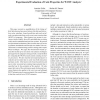Free Online Productivity Tools
i2Speak
i2Symbol
i2OCR
iTex2Img
iWeb2Print
iWeb2Shot
i2Type
iPdf2Split
iPdf2Merge
i2Bopomofo
i2Arabic
i2Style
i2Image
i2PDF
iLatex2Rtf
Sci2ools
115
click to vote
RTSS
2003
IEEE
2003
IEEE
Experimental Evaluation of Code Properties for WCET Analysis
This paper presents a quantification of the timing effects that advanced processor features like data and instruction cache, pipelines, branch prediction units and out-oforder execution units have on the worst-case execution time (WCET) of programs. These features are present in processors (such as MIPS, PowerPC and ARM) that are being widely used in embedded and real-time systems. We present an experimental evaluation of the execution time of a series of synthetic benchmarks and real-life case studies. The execution time is evaluated using extensive testing and a simple WCET technique. We argue that measurement based approaches backed up by structural code analysis techniques and supported by adequate testing provide a sound method for computing the WCET of such systems running on modern processors. We show that the most important factor in reduction of execution time is cache size (both instruction and data cache). Other factors like branch prediction and out-or-order execution hav...
Related Content
| Added | 05 Jul 2010 |
| Updated | 05 Jul 2010 |
| Type | Conference |
| Year | 2003 |
| Where | RTSS |
| Authors | Antoine Colin, Stefan M. Petters |
Comments (0)

